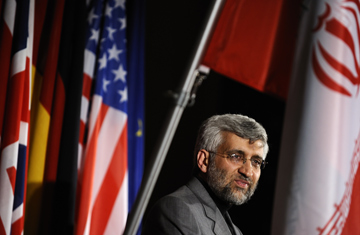
Iran's chief negotiator, Saeed Jalili, looks on during a press conference closing nuclear talks on Dec. 7, 2010, in Geneva
If there is any test today for Western diplomacy, it surely lies with Iran. While Tehran insists its nuclear program is for purely peaceful purposes, the U.S. and its allies assume the ultimate aim is to develop a bomb. Yet years of talks, threats and sanctions have failed to halt the program, and officials are at their wits' end on how to wean Iran off its nuclear habit.
This week the European Union picked up the baton. On Tuesday, E.U. foreign-affairs chief Catherine Ashton emerged from two days of talks with Iran's nuclear negotiator Saeed Jalili aimed at succeeding where countless others have failed. The result: an agreement to talk again, in January, in Istanbul. But is this really progress or just another Iranian scheme to buy more time for its nuclear scientists?
Speaking after the Geneva talks, Ashton maintained that they had been "detailed, substantive." She had headed a negotiating team representing the five permanent powers of the Security Council — Britain, China, France, Russia and the U.S. — plus Germany, a configuration dubbed "5+1." Ashton added that the Istanbul meeting next month would "discuss practical ideas and ways of cooperating toward a resolution of our core concerns about the nuclear issue."
Jalili did not offer much insight after the talks, telling Iran's Fars news agency merely that it was "not acceptable for Iran ... if Western countries still insisted on pursuing the path of pressure and negotiations." In Tehran, Iranian President Mahmoud Ahmadinejad said lifting the U.N. sanctions would make progress more likely. "If you come to talks ... and then cancel the wrong mistakes you took and cancel resolutions, sanctions and some restrictions that you imposed, it will definitely be helpful," he said. Iran is under four sets of U.N. sanctions for its refusal to suspend uranium enrichment — including bans on investments in oil, gas and petrochemicals, and measures targeting banks, insurance, financial transactions and shipping.
In many respects, the West has been here before. In negotiating sessions over the past eight years, Iran has been able to string its counterparts along while pressing ahead with its nuclear program. Although the previous talks, in Geneva in October 2009, appeared to end with agreement on a breakthrough deal under which Iran would export low-enriched uranium for processing abroad, the deal foundered after Iran introduced new conditions. In the meantime, Iran has produced over 3,000 kg (6,600 lb.) of low-enriched uranium at its fuel-production facility and last month announced that its first atomic-power plant had begun operations.
But there are differences this time around. The talks came days after the WikiLeaks revelations that Arab countries are just as wary of Iran as the West is, and Gulf Arab leaders meeting in Abu Dhabi appealed to Tehran on Tuesday to "respond positively" to talks with world powers about the Islamic Republic's contentious nuclear program. This latest round of U.N. sanctions also involved greater support from Russia and China than previous attempts, suggesting a more united international front.
Richard Gowan, a policy fellow at the European Council on Foreign Relations, points to Europe's contribution in helping contain Iran's atomic ambitions — particularly the progress made by Ashton, whose position as E.U. Foreign Minister did not exist a year ago. "Some people have wondered if the E.U. and Ashton have a role, but she has inserted herself into the process," he says. "The E.U. looks like a player again, although whether any of it really matters in persuading Iranians from going down the nuclear route is another matter. History shows talking to Iran could go on forever."
The two sides also appear to be edging toward a basic agreement: acceptance of Iran's right to enrichment but with intrusive inspections. "We recognize Iran's rights but insist it fulfills its obligations," Ashton said on Tuesday. Jörg Himmelreich, a senior fellow with the German Marshall Fund in Berlin, says this may be the best anyone can hope for, as the West is unlikely to be able to reverse the energy program. "In the long term, we cannot refuse Iran the right to use nuclear energy peacefully," he says.
Concerns about whether the Geneva talks represent a stalling strategy will no doubt be raised next month, when Ashton again leads her team in meetings with Jalili. Robert Malley, director of the Middle East program for the International Crisis Group, says the West needs to rise above the notion that it can — and should — expect a breakthrough in one meeting. "We should liberate ourselves from this metaphor of a ticking clock," he says. "We have to let diplomacy play out, even if the prospects are not high. What's the alternative to talking? There isn't one."
